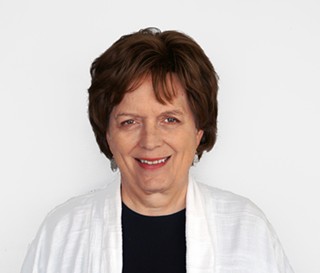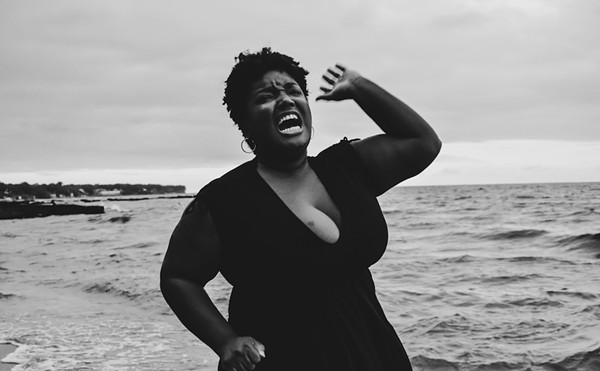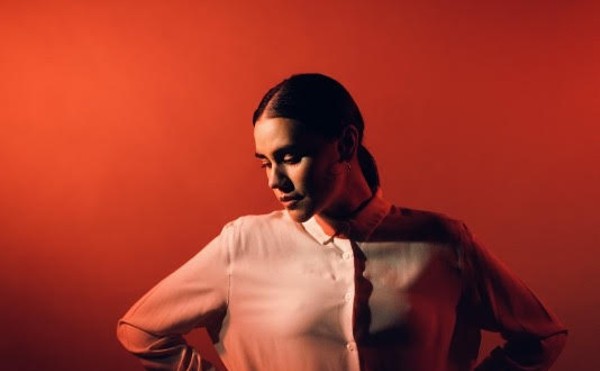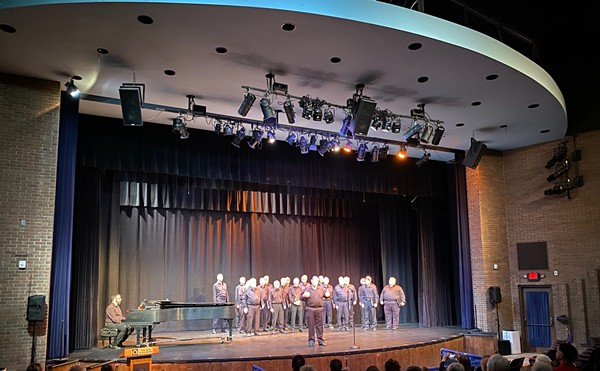FEED ME!
That demanding, sociopathic plant once again sings for its supper in Little Shop of Horrors at the Cleveland Play House
By Christine HoweySome shows are pretty much bulletproof, meaning they're so tight and clever that almost any production has a good chance of success. Such is the case with Little Shop of Horrors, now at the Cleveland Play House. With sharp book and lyrics by Howard Ashman and catchy tunes by Alan Menken, high schools and community theaters around the country have had fun with this horror-comedy (hor-com?) property that debuted more than 50 years ago.
Sure enough, this production at the Allen Theatre is often a fun ride. And if you've never seen this show before, the bloodthirsty plant and the sadistic dentist will definitely blow your skirt up. But if you have seen Little Shop previously, you may be distracted by some odd directorial choices and a couple performances that fall a tad short.
Like the Roger Corman movie that inspired it, the musical is about a florist shop in a rundown section of a big city run by snarky Mr. Mushnik. His staff includes nerdy Seymour and Audrey, a young woman who often comes to work with bruises thanks to her abusive dentist boyfriend, Orin. Mushnik can't sell flowers to the wasteoids in his neighborhood until Seymour displays an exotic hybrid plant he named Audrey II (as an homage to the co-worker he desires). This new botanical creation looks like a Venus flytrap and, he learns, has a ravenous thirst for human blood. Soon, Seymour becomes a blood bag for the fast-growing, corpuscle-craving carnivore that begins to talk and make its demands known in no uncertain terms.
The first curious production decision is apparent from the outset. Philip Witcomb's appropriately seedy, skid row set is littered with garbage, a tattered theater marquee, and a weather-beaten billboard that indicates that the time is late 1950s or early '60s. But then, positioned stage right, is a female squad of five supposed street urchins (who also play the accompanying instruments), dressed slickly like some sort of cool, urban Jetsons who have visited this armpit street from a drop-dead, hipper-than-thou boutique far in the future.
The program seeks to skate around that time warp by describing the time of the play as "an early year in a decade not too long before our own," which is a masterpiece of tortured time travel in itself.
So, what the hell, they're playing fast and loose with the timeframe. The core of the play is still about the relationship between Seymour and Audrey (the human one), and here everything goes pretty well, but not great. Apparently, director Amanda Dehnert didn't have time to attend to some performance details, since she was also busy being the choreographer and the musical director(!). This improbable trifecta probably looks like a winner on her paycheck, but less so on the stage.
For instance, Ari Butler, who sings well as Seymour, could have used some help in crafting a character that was more vulnerable and geeky. Aside from his first entrance, when he trips and spills a tray of plants, Butler is a rather bland and ordinary presence, not the clumsy, socially inept fellow who has a vicious plant as a best friend. In addition, his running and general movements are far too smooth and athletic for a dweeb like Seymour. (For a tutorial, see almost any Jerry Lewis film.)
This is not a small thing, since the more hapless Seymour looks, the more we root for him to win over human Audrey. But since Seymour appears only mildly shy, the tension doesn't build. As for Audrey herself, Lauren Molina peaks in her tender rendition of "Somewhere That's Green," perhaps the sweetest, chuckle-inducing ballad ever penned — especially when she trills about her dream house with "a fence of real chain link!" But the rest of the time, Molina leans too heavily on a screechy Queens accent that sometimes feels pushed.
In the spotlight role of the S&M dentist Orin, Joey Taranto huffs and puffs without much imagination in his featured song, "Dentist." But he displays more wit in a later scene when he tries to get Seymour into his torture chair for a molar extraction. As the voice of Audrey II, Eddie Cooper (who is visible, stationed behind the urchin band) growls effectively as puppeteer Kev Abrams operates the eventually man-sized plant.
There are other small glitches, such as having a member of the stage crew, with headphones on, push the florist shop façade open and closed several times during fully lit scenes happening a couple paces away. A director who isn't multi-tasking might have found a way to make that necessary function integrate more smoothly into the production, since it is in full view.
Still, the material carries the day with Little Shop, as it always does, especially when Audrey (the human) finds her way to a decidedly surprising, Miracle-Gro happy ending. Turns out, it is easy being green.












